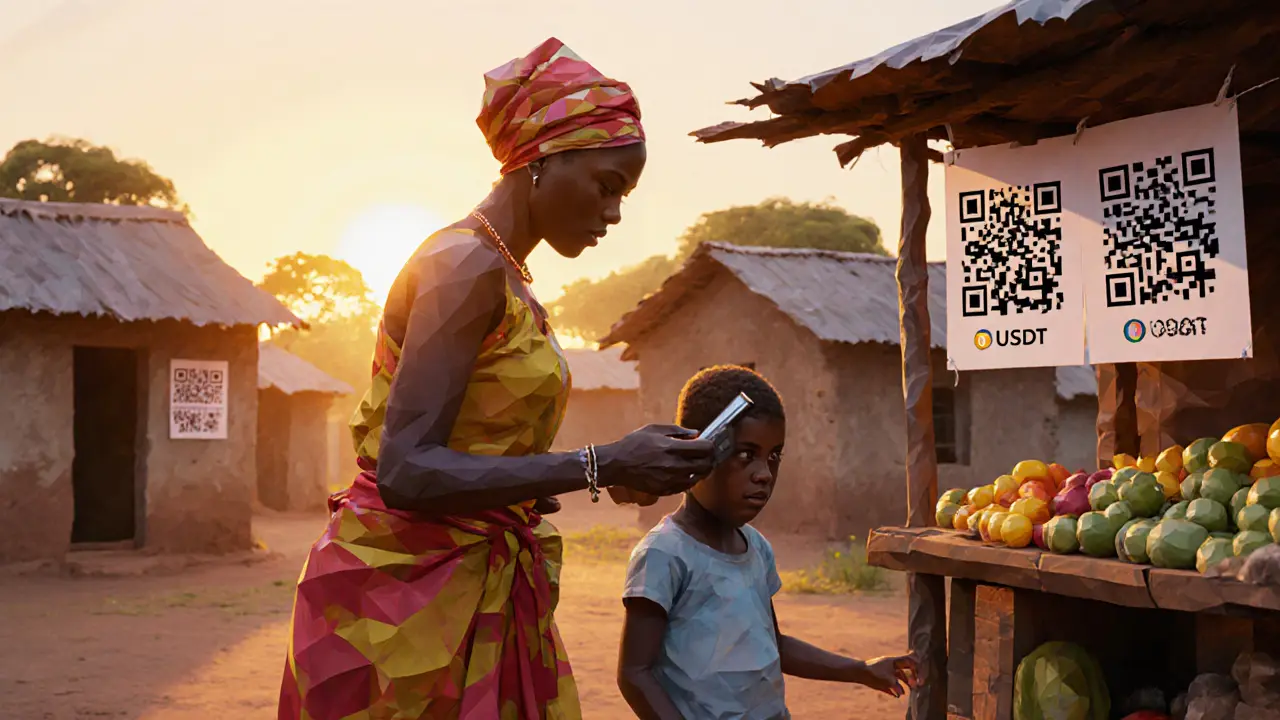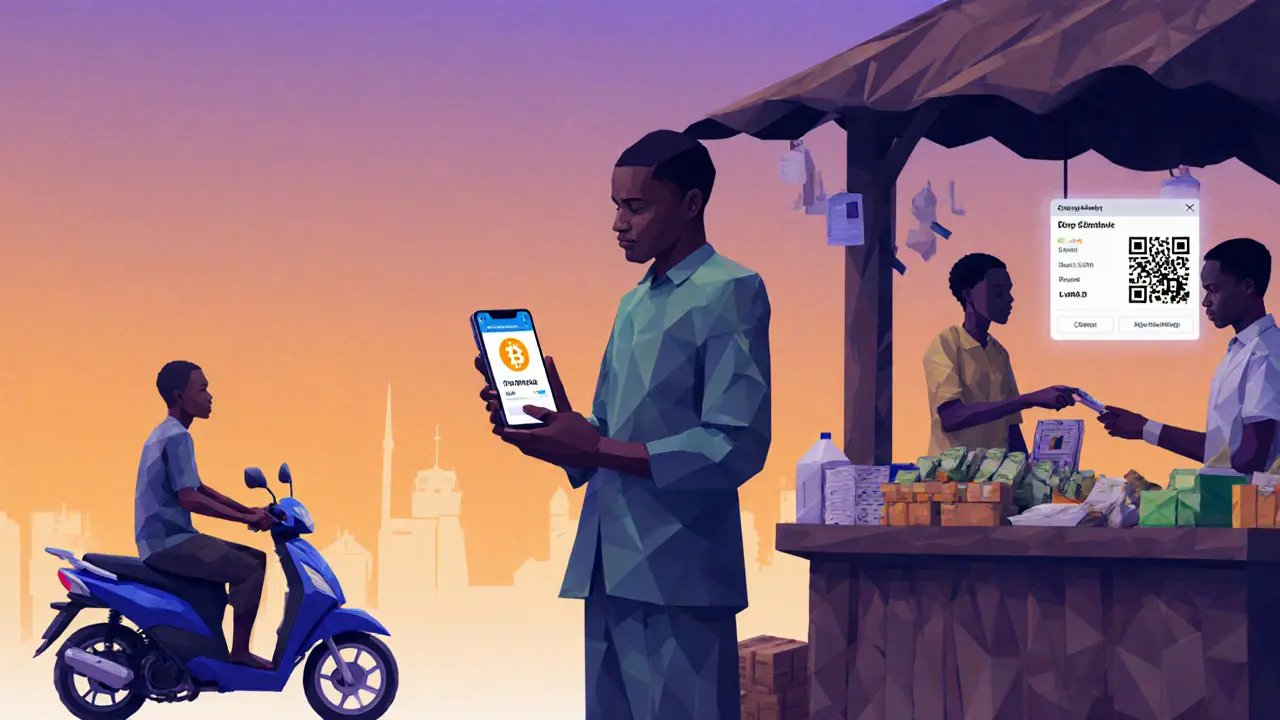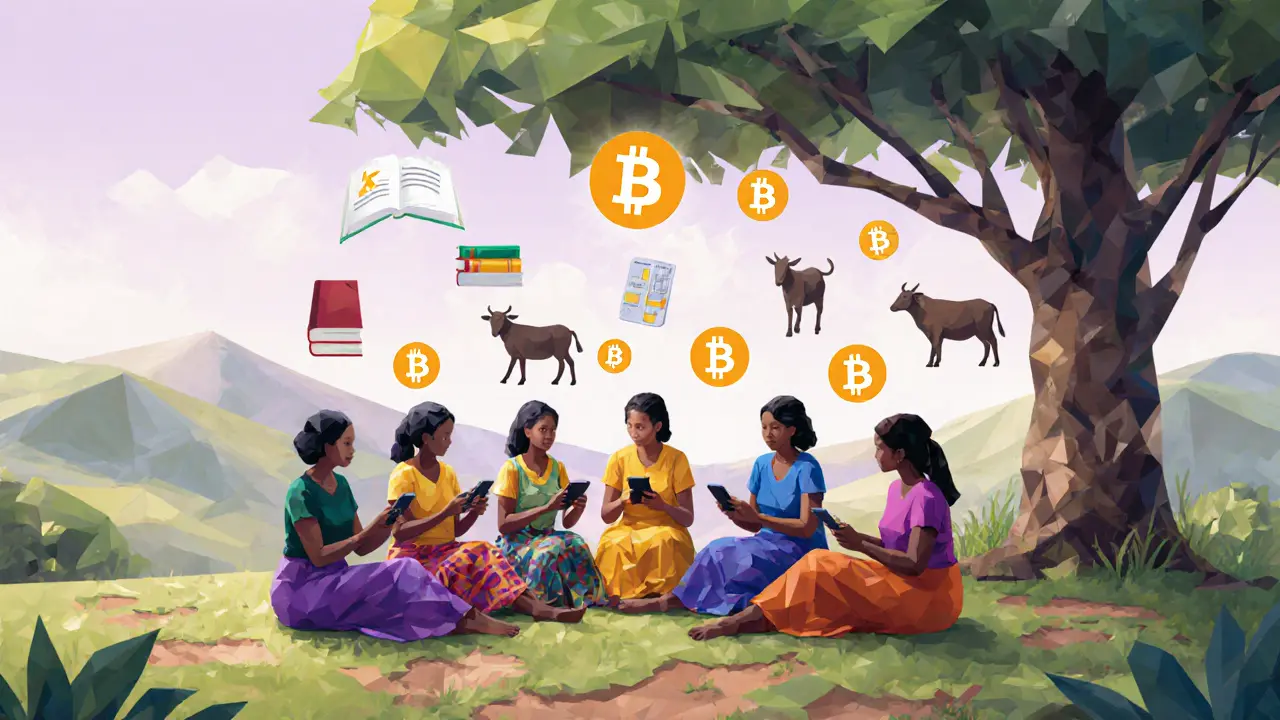How Cryptocurrency Is Helping the Unbanked in Developing Countries
 Nov, 7 2025
Nov, 7 2025
Remittance Cost Calculator
Compare the real cost of sending money home using traditional services versus cryptocurrency. Based on World Bank data and industry averages.
Cost Comparison
More than 1.4 billion people around the world don’t have a bank account. In places like Nigeria, Kenya, and rural parts of India, many people live paycheck to paycheck, unable to save, send money home, or even get a small loan. Traditional banks won’t serve them-too far, too expensive, or too much paperwork. But smartphones and crypto are changing that. For the first time, someone in a village without a bank branch can send money to a relative in another country, hold value that won’t vanish overnight, or even start a small business-all without needing a bank.
Why Banks Left So Many Behind
Banks in developing countries aren’t just hard to reach-they’re often designed for people who already have money. You need a government ID, proof of income, and a minimum balance just to open an account. In rural areas, the nearest bank might be 30 kilometers away. For a farmer who earns $2 a day, paying $10 in transport costs just to deposit $20 doesn’t make sense. And if you’re undocumented, or your income is cash-based, banks won’t touch you. That’s where crypto steps in. All you need is a smartphone and internet access. No forms. No minimum balance. No credit check. You download a wallet app, create a key, and you’re in. In Kenya, over 30% of adults now use crypto for payments or remittances. In Nigeria, it’s one of the top three ways people store value. These aren’t tech elites-they’re market vendors, motorcycle drivers, and mothers sending money to family abroad.Crypto Solves the Remittance Problem
Every year, migrant workers send over $600 billion to their home countries. Most of that money flows through companies like Western Union or MoneyGram, which charge 6% to 15% in fees. That’s $90 to $225 lost on every $1,500 sent. In contrast, sending Bitcoin or stablecoins like USDT costs less than 1%. Transactions finish in minutes, not days. In the Philippines, where over 10 million people rely on remittances, crypto platforms like Coins.ph and Paxful let users receive money directly into their wallets, then cash out at local shops or ATMs. No bank account needed. In Mexico, workers in the U.S. use crypto to send money home faster and cheaper than traditional wire services. The World Bank found that countries with higher crypto adoption saw remittance costs drop by 20% over three years.Beating Inflation with Digital Gold
In countries like Argentina, Venezuela, and Lebanon, local currencies have lost 80%, 90%, or even more of their value in just a few years. People used to keep cash under the mattress-until inflation made it worthless. Now, many are turning to Bitcoin or stablecoins as a digital store of value. Bitcoin’s fixed supply of 21 million coins means it can’t be printed away like a government currency. In Venezuela, where the peso collapsed in 2023, crypto adoption surged. People bought Bitcoin to protect their savings, then used it to pay for groceries, medicine, or school fees through peer-to-peer apps. A 2024 study from the University of Lagos found that 41% of crypto users in Nigeria cited inflation protection as their main reason for using digital assets. Stablecoins-crypto tied to the U.S. dollar-are even more popular for everyday use. They keep their value steady, so you don’t wake up to find your savings halved. In Ghana, traders use USDT to buy and sell goods across borders without dealing with currency exchange rates or bank delays.
How Crypto Helps Small Businesses
Small business owners in developing countries rarely get loans. Banks say they don’t have enough history, collateral, or paperwork. But crypto opens new doors. Tokenization is one emerging solution. A farmer in Uganda can tokenize his future harvest-sell digital shares of his crops to investors overseas-and get cash upfront. A tailor in Rwanda can issue a digital token representing her business’s value and raise $500 from a global network of backers, not a local bank. Platforms like Ribbon and Bitbond let entrepreneurs in Indonesia, Colombia, or Tanzania apply for microloans using crypto as collateral. No credit score needed-just proof of transaction history on the blockchain. In 2024, over 120,000 small businesses in Africa received funding through crypto-based lending platforms, up from just 18,000 in 2021.The Real Barriers: Internet, Trust, and Rules
Crypto isn’t magic. It has serious hurdles. First, internet access. In rural Mozambique or parts of Afghanistan, 4G is a luxury. Without reliable connectivity, crypto wallets are useless. Even in cities, power outages can wipe out phone batteries, and without backup keys, people lose everything. Second, security. Losing your private key means losing your money-forever. Most users don’t understand seed phrases or cold wallets. Scammers target them with fake apps and phishing texts. A 2025 report from the African Cybersecurity Institute found that 62% of first-time crypto users in Nigeria fell for scams in their first year. Third, regulation. Some governments ban crypto outright. Others make it so confusing that people fear using it. In India, crypto trading was nearly shut down in 2022 due to unclear rules. In Nigeria, banks blocked crypto transactions in 2021, forcing users to turn to peer-to-peer markets. The lack of legal clarity scares off even those who want to use it responsibly.What’s Working: Grassroots Solutions
Despite the challenges, real progress is happening-not from big banks or Silicon Valley startups, but from local communities. In Uganda, a group of women started a crypto savings circle. Each week, they pool $5 each, buy Bitcoin together, and hold it for six months. At the end, they cash out and split the profits. Some used it to pay school fees. Others bought livestock. In Ghana, local shops now accept USDT for everything from phone credit to cooking oil. Users scan a QR code, pay in crypto, and get a receipt. No bank involved. The government even started testing its own digital currency, the e-Cedi, to make this easier. In the Philippines, community leaders teach crypto basics in barangay halls. They use simple analogies: “Your private key is like your house key. If you lose it, no one can help you get back in.” They show people how to back up their keys on paper. It’s low-tech, but it works.
The Future Isn’t About Replacing Banks-It’s About Filling Gaps
Crypto won’t replace banks in developing countries. But it can do what banks won’t: reach the unreachable. Experts from Georgetown University say crypto’s real power lies in being a bridge-not a replacement. For the unbanked, it’s a way to join the global economy. For the banked, it’s a faster, cheaper way to send money or protect savings. Governments that embrace crypto wisely are seeing results. El Salvador made Bitcoin legal tender in 2021. While controversial, it helped reduce remittance costs and brought over 2 million new users into the digital economy. Ghana’s e-Cedi project is testing how a central bank digital currency (CBDC) can work alongside crypto to serve both banked and unbanked populations. The key? Education. Regulation that protects, not punishes. Infrastructure that reaches the last mile. And partnerships between local communities, tech developers, and NGOs.What You Can Do to Help
If you’re outside a developing country and want to support financial inclusion:- Use crypto to send remittances-choose platforms with low fees like Strike or BitPesa.
- Donate to nonprofits teaching crypto literacy in rural areas, like BitGive or Crypto4Africa.
- Support businesses in developing countries that accept crypto. Buy from them. Share their stories.
- Start small. Use a stablecoin to save or send money before trying Bitcoin.
- Write down your recovery phrase. Keep it safe. Don’t screenshot it.
- Join local crypto education groups. Ask questions. Learn from others.


Benjamin Jackson
November 7, 2025 AT 18:38Crypto isn't perfect, but it's the first financial tool that actually meets people where they are. No ID? No problem. No bank branch? Still fine. Just a phone and a little courage. That's powerful.
Louise Watson
November 9, 2025 AT 10:25It’s not about wealth. It’s about access. And access? That’s dignity.
Anthony Allen
November 10, 2025 AT 13:18I’ve seen this in rural India-women using USDT to pay for school supplies. No middlemen. No delays. Just a QR code and a smile. This is real change.
Liam Workman
November 11, 2025 AT 13:33Imagine waking up and your savings haven’t been stolen by inflation. That’s not magic-that’s math. Bitcoin’s supply cap isn’t a feature, it’s a promise. And for people who’ve been burned by their own governments, that promise means everything. 🌍
Robert Bailey
November 12, 2025 AT 23:33My cousin in Lagos uses crypto to send money to his sister in Port Harcourt. Used to take three days and cost 12%. Now it’s 20 minutes and 0.5%. He calls it his ‘silent revolution’.
Sarah Scheerlinck
November 13, 2025 AT 06:06I’ve worked with women’s co-ops in Kenya. They don’t care about blockchain. They care about getting their kids fed. Crypto just gives them a tool that doesn’t treat them like criminals for being poor.
Jeana Albert
November 14, 2025 AT 02:34Oh please. You think these people actually understand what a private key is? Most of them get scammed within weeks. This isn’t empowerment-it’s exploitation dressed up as innovation.
Megan Peeples
November 15, 2025 AT 06:28Let’s be real: this is just another Silicon Valley fantasy. You think a farmer in Uganda can securely store a seed phrase? Please. They’re being used as guinea pigs for unregulated tech. And you’re cheering?
Vipul dhingra
November 16, 2025 AT 01:14karan thakur
November 17, 2025 AT 12:16This is all a Western plot to destabilize local currencies. Look at Nigeria’s central bank-they banned crypto for a reason. The IMF and Wall Street want control. You’re being played.
Natalie Nanee
November 17, 2025 AT 15:03It’s not about crypto. It’s about choice. People in these countries have been told they’re too poor, too uneducated, too messy to be part of the financial world. Crypto says: ‘You don’t need permission.’
Jacque Hustead
November 18, 2025 AT 19:36I’ve seen local NGOs teach crypto literacy using chalkboards and flipcharts. No internet needed. Just stories. ‘Your key is your house key.’ That’s how real education happens. Not in labs-in villages.
Finn McGinty
November 20, 2025 AT 11:31While the romanticization of crypto as a panacea for financial exclusion is understandable, one must not overlook the structural fragility inherent in such systems. The absence of regulatory oversight, coupled with the acute vulnerability of non-technical populations to social engineering attacks, renders this ‘empowerment’ perilously contingent upon user literacy-a commodity often in critically short supply. One cannot help but question whether the narrative of liberation is, in fact, a veil for the expansion of speculative capital into previously untapped demographic markets.
Wendy Pickard
November 22, 2025 AT 01:18My neighbor in Detroit uses crypto to send money to her mom in Jamaica. She said it’s the first time she didn’t feel like she was being ripped off. That’s worth more than any whitepaper.
Evan Koehne
November 22, 2025 AT 17:36So let me get this straight-you’re telling me the solution to systemic poverty is… more tech that only 10% of people understand, built on a network that uses more electricity than Argentina? Brilliant. Next you’ll say we should solve hunger with NFTs of potatoes.